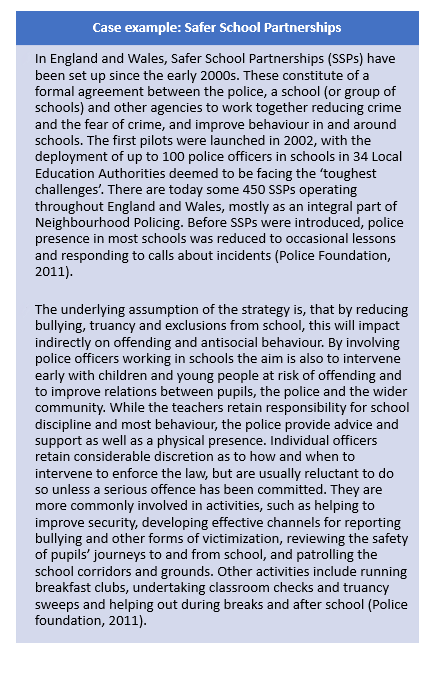Building partnerships with communities
Working together with local community members is essential for COP to function well and is one of the first steps toward its implementation. However, building these partnerships can prove to be a challenging task, especially the police-community relationship has been damaged throughout the years. Here, you can find information on how-to overcome those challenges, avoid pitfalls and take a look at some of the best practices for building partnerships with communities.
Because we can achieve so much more, when working together!
Overview of the challenges and their potential pitalls and solutions:
Gaining trust:
Pitfall: Obliging cooperation
Solution: Starting small, showing results
Identifying community stakeholders:
Pitfall: Working with non-representative stakeholders
Solution: Diversifying the group of stakeholders
Overcoming time and financial restrictions:
Pitfall: Superficial, short term involvement
Solution: Starting small, showing results
Gaining trust
Introduction
One of the most prevailing challenges for COP in the Western-Balkans is to overcome the lack of trust in authorities shared in many local communities (Policy Association for an Open Society, 2016). This lack of trust is a common characteristic of many post-conflict societies around the world (Mishler & Rose, 2001). Therefore, knowing the context of the community and its history is key: where does the attitude towards the police (and other legal institutes) come from, and more importantly, how can we build healthy relationships with these communities which such low levels of trust?
“Trust is critical to democracy. […]. This is particularly so for new regimes whose predecessors proved unworthy of trust, as is the case for most post-Communist regimes in Eastern and Central Europe […].”
- Mishler & Rose (2001, p. 30)
Possible solutions
In theory, building trust can have a relatively simple solution: prove that you are worthy of trust. However, in praxis, this proves to be a long-term and challenging task. Especially when considering the scientific theories underlying building institutional trust, such as trusting the police. There are two main viewpoints on the origin of trust in the scientific literature: a cultural and an institutional perspective.
The cultural perspective argues that institutional trust originates in early-life through cultural influences and socialization of norms on trusting. Since this is a deep-rooted way of thinking, following this perspective, building trust is a very slow process and sometimes almost unchangeable aspect of communities.
In contrast, the institutional perspective argues that institutional trust is a consequence of institutional performance. In other words, institutions earn the trust of citizens through their own doing. This provides a more promising outlook for the police being able to build healthy relationships with local communities. Moreover, if police are able to keep up the good work, slowly but steadily, the cultural view on trust may also change some day.
Addressing these issues, however, is an ambitious, long-term goal which cannot be overcome by single police forces and police chefs alone. Here, the involvement on many layers is necessary, including other institutions such as the government, parliament, et cetera. That is where COP’s potential comes to the fore: police officers can engage with the local community directly, surpassing any potential blockages on higher levels (e.g. governments, police chefs, etc.). In essence, each police officer can take up his or her own part in building up a partnership and that way gaining trust by getting involved in his or her community.
This can start out very small, by organising smaller events, such as a sports competition in which both police and community members participate in the same team, or by attending schools and talking with youth about their interests and potential issues althewhile helping out at the school (see case example below). However, in order to achieve a lasting and more significant improvement in the relationship between the local community and the police, cooperation within the police is essential.

References
Mishler, W., & Rose, R. (2001). What are the origins of political trust? Testing institutional and cultural theories in post-communist societies. Comparative political studies, 34(1), 30-62.
Policy Association for an Open Society. (2016). PASOS project poll: Trust in public institutions declines in Western Balkans. Retrieved from http://pasos.org/pasos-project-poll-trust-in-public-institutions-declines-in-western-balkans/.
Police Foundation 2011: Safer School Partnerships, The briefing, Series 2, Edition 2 – November 2011.






